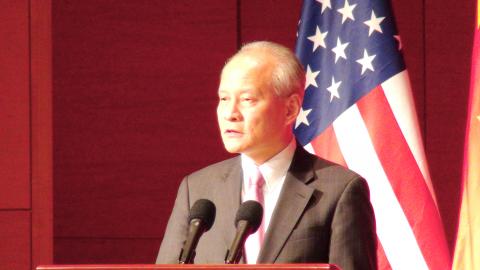Chinese Ambassador to Washington Cui Tiankai (崔天凱) on Tuesday characterized Taiwanese officials as having a “lackey mentality” after a Taiwanese delegation met with US politicians.
Led by former premier Yu Shyi-kun (游錫堃), the delegation visited the US to attend US President Donald Trump’s inauguration ceremony in Washington on Friday last week.
Cui said on the sidelines of a Lunar New Year reception at the Chinese embassy that “there have been some opportunistic politicians from Taiwan making some petty moves” while the US is undergoing an administration change.

Photo: CNA
“Some people think that they have met somebody after coming to the US and felt self-complacent about it; I consider it a kind of lackey mentality,” Cui said.
When asked about the possibility of Trump revisiting the “one China” policy and Taiwan’s concern about becoming a bargaining chip in China-US deals, Cui said that if Taipei wants to avoid becoming a bargaining chip, “just return to the foundation of the [so-called] ‘1992 consensus’ and recognize that the two sides of the Taiwan Strait belong to ‘one China’ and the people on both sides are Chinese.”
“Once this great principle of the nation is understood, [Taiwan] has nothing to worry about, as it would be standing with the 1.3 billion Chinese,” he said.
“However, if you have to separate yourself from or pit yourself against the 1.3 billion Chinese, then there is more for you to worry about” other than becoming a bargaining chip, Cui said.
He said that the “one China” policy is the political foundation for China-US relations.
“We firmly uphold the ‘one China’ principle; it is unshakable and nonnegotiable,” he said.
Democratic Progressive Party Legislator Lo Chih-cheng (羅致政) said in Taipei yesterday that interactions between Taiwanese and US officials are precisely the “product of Chinese oppression.”
Cui’s words “were merely sour grapes, because a meeting of any kind between our people and US officials is a breakthrough,” Lo said.
Chinese Nationalist Party (KMT) caucus convener Sufin Siluko (廖國棟) said “it is up to us to decide whether [we are being] lackeys; it is none of [China’s] business and it should focus on taking care of its own business.”
New Power Party Legislator Freddy Lim (林昶佐), a member of the delegation, said China should not be taken aback by other nations engaging in exchanges, “which is perfectly normal.”
Regarding South China Sea issues, Cui said that there are territorial and maritime disputes between China and some ASEAN members, but it is not an issue of geopolitical strategy or competition, nor is it a problem between China and the US, as the latter has no territorial claims in the region.
Things are improving between China and ASEAN members that China has disputes with, he said, adding that “against this backdrop, any country from outside the region should promote regional cooperation to return peace and stability back to the South China Sea, rather than doing the opposite.”
He reiterated that China cares about navigational safety and freedom in the region more than anyone else, as the South China Sea is “right on China’s footstep” and it relies on passage through it for trade.
He said as the China-US trade relationship is based on achieving mutual interests and a win-win situation, China is firmly opposed to a trade war with Washington, because both sides would suffer as a result.
The US should develop a strong and stable economic and trade relationship with China if it wants to make gains in this big market, Cui said.
Additional reporting by Alison Hsiao

An essay competition jointly organized by a local writing society and a publisher affiliated with the Chinese Communist Party (CCP) might have contravened the Act Governing Relations Between the People of the Taiwan Area and the Mainland Area (臺灣地區與大陸地區人民關係條例), the Mainland Affairs Council (MAC) said on Thursday. “In this case, the partner organization is clearly an agency under the CCP’s Fujian Provincial Committee,” MAC Deputy Minister and spokesperson Liang Wen-chieh (梁文傑) said at a news briefing in Taipei. “It also involves bringing Taiwanese students to China with all-expenses-paid arrangements to attend award ceremonies and camps,” Liang said. Those two “characteristics” are typically sufficient

A magnitude 5.9 earthquake that struck about 33km off the coast of Hualien City was the "main shock" in a series of quakes in the area, with aftershocks expected over the next three days, the Central Weather Administration (CWA) said yesterday. Prior to the magnitude 5.9 quake shaking most of Taiwan at 6:53pm yesterday, six other earthquakes stronger than a magnitude of 4, starting with a magnitude 5.5 quake at 6:09pm, occurred in the area. CWA Seismological Center Director Wu Chien-fu (吳健富) confirmed that the quakes were all part of the same series and that the magnitude 5.5 temblor was

The brilliant blue waters, thick foliage and bucolic atmosphere on this seemingly idyllic archipelago deep in the Pacific Ocean belie the key role it now plays in a titanic geopolitical struggle. Palau is again on the front line as China, and the US and its allies prepare their forces in an intensifying contest for control over the Asia-Pacific region. The democratic nation of just 17,000 people hosts US-controlled airstrips and soon-to-be-completed radar installations that the US military describes as “critical” to monitoring vast swathes of water and airspace. It is also a key piece of the second island chain, a string of

The Central Weather Administration has issued a heat alert for southeastern Taiwan, warning of temperatures as high as 36°C today, while alerting some coastal areas of strong winds later in the day. Kaohsiung’s Neimen District (內門) and Pingtung County’s Neipu Township (內埔) are under an orange heat alert, which warns of temperatures as high as 36°C for three consecutive days, the CWA said, citing southwest winds. The heat would also extend to Tainan’s Nansi (楠西) and Yujing (玉井) districts, as well as Pingtung’s Gaoshu (高樹), Yanpu (鹽埔) and Majia (瑪家) townships, it said, forecasting highs of up to 36°C in those areas